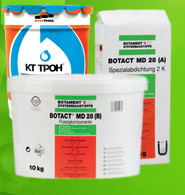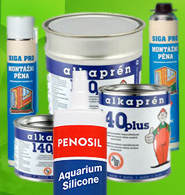Обеспечение антикоррозионной защиты и поддержание её высоких эксплуатационных характеристик являются одними из наиболее важных факторов, гарантирующих надёжность и длительный срок службы трубопровода. Комплексная программа мероприятий по антикоррозионной защите осуществляется на всех этапах — как производства труб, так и строительства и эксплуатации трубопроводов.
Insulating bitumen BNI GOST 9812-74 for anti-corrosion works
Bitumen for insulating oil and gas pipelines and other structures must meet the requirements of GOST 9812 - 74, which establishes the production and use of three grades of insulating bitumen: BNI-IV-3 Ecobit, BNI-IV Ecobit and BNI-U Ecobit.
Теlephon, Viber, WhatsApp, Telegram: +38 050 617-64-77, e-mail: 7853221@gmail.comТеlephon:+38 067 857-26-62, +38 099 905-98-60, +38 098 704-59-17, +38 098 972-98-00
1. Insulating bitumen BNI Ecobit GOST 9812-74 for anti-corrosion work
|
1. BNI-IV-3 Ecobit GOST 9812-74 insulating bitumen |
Insulating bitumen BNI-IV-3 Ecobit GOST 9812-74 (Code: BT-000008) Petroleum insulating bitumen grades: BNI-IV-Z Ecobit, BNI-IV Ecobit and BNI-V Ecobit are used to insulate pipelines from ground corrosion. Insulating bitumens are obtained by oxidation of residual products of direct distillation of oil or their mixtures with asphaltenes and oil production extracts; the use of cracking products is not allowed. |
|
2. BNI-IV Ecobit GOST 9812-74 insulating bitumen |
Insulating bitumen BNI-IV Ecobit GOST 9812-74 (Code: BT-000009) Petroleum insulating bitumen grades: BNI-IV-Z Ecobit, BNI-IV Ecobit and BNI-V Ecobit are used to insulate pipelines from ground corrosion. Insulating bitumens are obtained by oxidation of residual products of direct distillation of oil or their mixtures with asphaltenes and oil production extracts; the use of cracking products is not allowed. |
|
3. BNI-V Ecobit GOST 9812-74 insulating bitumen |
Insulating bitumen BNI-V Ecobit GOST 9812-74 (Code: BT-000010) Petroleum insulating bitumen grades: BNI-IV-Z Ecobit, BNI-IV Ecobit and BNI-V Ecobit are used to insulate pipelines from ground corrosion. Insulating bitumens are obtained by oxidation of residual products of direct distillation of oil or their mixtures with asphaltenes and oil production extracts; the use of cracking products is not allowed. |
It is quite obvious that one of the most versatile and popular building materials used in completely different areas is bitumen. Due to its special composition, construction bitumen is used at various stages of construction of new buildings. And it is likely that it was the use of petroleum construction bitumen that influenced its traditionally widespread use in the entire construction process. Construction petroleum bitumen is a complex mixture of hydrocarbons and heteroorganic compounds with a diverse structure.
The unique structure of the base gives construction petroleum bitumen special properties that contribute to its most effective use in a wide variety of construction areas. Construction petroleum bitumen is often used in the process of waterproofing concrete buildings and foundations, in the process of preliminary priming of bases for soft roofs, in addition, construction bitumen is actively used in the production of bitumen mastics, bitumen primer, hydroglass insulation and some other materials necessary in construction.
One of the reasons for the growing popularity of petroleum construction bitumen is the low cost of this waterproofing material, without which not a single construction project can be completed.
The main works in which bitumen is used are roof repairs and bitumen waterproofing of foundations. This type of work necessitates large volumes of this material, which leads to an increase in purchases of raw materials. There are many analogues of construction bitumen on the market, but as practice shows, the cost of substitutes is much higher than the original, which is why, other things being equal, other raw materials cannot withstand competition in the market.
Due to its properties, construction bitumen BN 70/30 has all the qualities necessary for construction and is guaranteed to provide a high level of protection of objects from the adverse destructive effects of the external environment.
In particular, a composition containing bitumen will be an excellent waterproofing agent and will create additional protection from constant mechanical and physical influences.
1. What properties characterize the brand of bitumen?
Therefore, they strive to ensure that the paraffin content in bitumen does not exceed 5%. The main indicators characterizing the properties of bitumen include penetration, ductility, brittleness temperature, adhesion, surface tension at the interface, cohesion, thermal, optical and dielectric properties.
2. What are the main performance properties of bitumen?
The main operational properties that determine the quality of bitumen are: Technical properties - permeability of a standard needle (penetration), softening temperature, penetration index, extensibility (ductility), brittleness temperature. These are the main indicators of bitumen quality.
3. What is the hazard class of bitumen?
The fact is that bitumen products are viscous and are often transported at elevated temperatures in order to preserve them in a liquid state. Therefore, there is a practice of transporting bitumen in tanks as hazard class 9
4. What types of bitumen are there?
Road bitumen comes in two types: viscous and liquid. Both are flammable substances with a flash point of 65 to 120 degrees Celsius (for liquid bitumen), or above 220 degrees Celsius (for viscous bitumen).
5. How to determine the quality of bitumen?
The quality of bitumen is assessed by a combination of different indicators, with penetration at 25°C being the main one....
The main indicators of bitumen are:
Penetration at 25°C.
Softening point
Brittle point
Flash point
Bitumen ductility
Viscosity: kinetic and dynamic
6. How to determine the extensibility of bitumen?
The extensibility of bitumen is taken to be the length of the bitumen thread in centimeters, marked with an indicator at the moment of its breaking. Three determinations are carried out for each sample. The arithmetic mean of three parallel determinations is taken as the final result.
7. How is bitumen formed?
Bitumen (from the Latin bitumen - mountain tar, “asphalt”) is a product of oil weathering. Solid or tar-like products, which are a mixture of hydrocarbons and their nitrogenous, oxygenous, sulfurous and metal-containing derivatives.
8. What is needed to transport bitumen?
Requirements for transportation of bitumen
the driver must have an ADR certificate with an approval mark for class 9 in the “tank” column;the vehicle must receive a certificate of approval for the transportation of dangerous goods (in the case of using a road train - separate certificates for the tractor and semi-trailer);
9. How are bitumens classified according to their intended purpose?
By purpose
The materials can be asphalt concrete mixtures, bitumen mastics, bitumen emulsions and other products.
Roofing bitumens are common as protective coatings. They are divided into covering materials - roofing felt, glassine, etc., and into impregnating ones - mixtures for treating coatings and structures.
10. What is road bitumen?
Road bitumen (abbreviated BND - petroleum road bitumen) is a viscous petroleum bitumen used in road construction, used for binding stone (crushed stone) and inert materials (sand). To increase the service life of road surfaces, various grades of road bitumen are used.
11. What is the difference between road bitumen and construction bitumen?
The main difference between road and construction bitumen is the different viscosity and elasticity indicators. The first type is subject to increased requirements in terms of strength and hardness, and the second type - in terms of water resistance.
12. What can bitumen be used for?
Currently, various types of bitumen have found their application in the road construction industry (75–80% of the total share of bitumen consumption), foundry and electrochemical production, medicine, paint and varnish products and cable products, and the production of roofing materials.
13. What is liquid bitumen?
Liquid bitumen is a material that is actively used in most construction processes due to a number of its unique qualities. Among other things, bitumen has excellent water-repellent properties, which allows it to be used as a waterproofing material for roofing.
14. How are bitumens marked?
Petroleum bitumen (BN) roofing bitumens (K) are marked in a similar way, except that another symbol is added to their letter name. There are four grades of petroleum roofing bitumen: BNK-90/30, BNK-90/40 and BNK-45/180, as well as BNK-45/190.
15. Where are construction bitumens used?
Bitumen is actively used in the production of asphalt concrete. In roofing works. Soft roofing materials are produced from bitumen: rolled and in the form of tiles. Examples: rubemast, hydrostekloizol, roofing felt, mastic, glassine, bitumen paper, fiberglass.







 Ukraine
Ukraine Kazakhstan
Kazakhstan Belorussia
Belorussia Moldova
Moldova Russia
Russia Uzbekistan
Uzbekistan Azerbaijan
Azerbaijan Armenia
Armenia Georgia
Georgia Kyrgyzstan
Kyrgyzstan Turkmenistan
Turkmenistan Tajikistan
Tajikistan Poland
Poland Hungary
Hungary Romania
Romania Bulgaria
Bulgaria Czech
Czech Slovenia
Slovenia Slovakia
Slovakia Serbia
Serbia Croatia
Croatia Montenegro
Montenegro Bosnia
Bosnia Estonia
Estonia Latvia
Latvia Lithuania
Lithuania